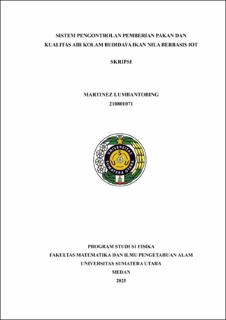Sistem Pengontrolan Pemberian Pakan Dan Kualitas Air Kolam Budidaya Ikan Nila Berbasis Iot
Design Of An Iot-Based System For Automated Feeding And Water Quality Monitoring In Nile Tilapia Aquaculture

Date
2025Author
Lumbantobing, Martinez
Advisor(s)
Situmorang, Marhaposan
Metadata
Show full item recordAbstract
Tilapia fish farming is highly dependent on water quality and timely feeding. This research aims to design and implement an automated Internet of Things (IoT)-based system capable of controlling pond water quality and scheduling fish feeding. The system utilizes an ESP8266 microcontroller connected to pH sensors, turbidity sensors, a light intensity sensor (LDR), an RTC module, pumps, a DC motor, and various actuators. Sensor data are displayed on an LCD and sent to users via Telegram bot notifications. Based on a 10-day test, the system successfully performed scheduled feeding twice daily at 09:00 and 15:00, while maintaining pH levels within 6-7.5. When pH dropped below 6, a basic solution was automatically dispensed to stabilize the pH. Turbidity gradually increased and exceeded 50 NTU on days 4, triggering an automatic water replacement process. The results also indicate a correlation between light intensity and both pH and turbidity, where higher light levels increased pH and suspended particle accumulation. The system supported fish growth, with an average weight gain of 10 grams per fish among 15 specimens within 5 days. These findings demonstrate that the system can improve the efficiency and quality of tilapia aquaculture in a practical and measurable manner
Collections
- Undergraduate Theses [1380]
